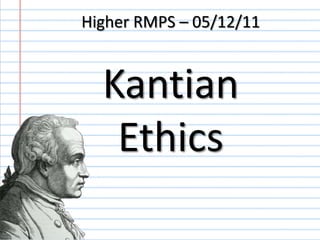
Higher RMPS - Kantian Ethics (No Audio)
- 1. Higher RMPS – 05/12/11 Kantian Ethics
- 2. Using the above words for guidance, list 3 disadvantages of Utilitarianism.
- 3. What will we be learning? o I understand the main principals of Kantian Ethics. o I can identify advantages and disadvantages of this viewpoint.
- 4. What will we be learning? o How does Kant say we should act towards each other? o How does Kant interpret duty? o What is the ‘summon bonum’? o What is the Categorical Imperative? o What is universality?
- 5. What is Deontology? Deon - tology ‘Duty’ ‘Study of’ Deontology is the study of both the actions and intentions of actions to determine the morality thereof.
- 6. Immanuel Kant 1723 – 1804 o German Philosopher o Born privileged o Deeply religious o University at 16 o The Enlightenment o Copernican Revolution o Contemporary of Hume o Before Bentham.
- 7. 18th Century Germany Prussian Enlightened Wars Absolutism Holy Roman Empire
- 8. “Act in such a way that you treat humanity, whether in your own person or in the person of any other, never merely as a means to an end, but always at the same time as an end.” Immanuel Kant, Groundwork of the Metaphysic of Morals, 1785
- 9. Means to an End… Kant saw that peoples’ actions were based on the end result. He proposed a shift in thinking. Instead of using people to achieve your goals, make your goals to serve people. “The ends do not justify the means.”
- 10. Duty… Kant noted that it is everyone’s duty to act out of good-will. ‘Duty’ is what you ‘should’ do in a situation.
- 11. Kant posited that there were two types of knowledge… A Priori Posteriori Knowledge gained Knowledge gained with reason through experience
- 12. Kant posited that there were two types of knowledge… A Priori Posteriori Knowledge gained Knowledge gained with reason through experience
- 13. Kant posited that there were two types of knowledge… A Priori Posteriori Knowledge gained Knowledge gained with reason through experience
- 14. Reason Kant believed in the Sovereignty of Reason. He believed that there were moral absolutes. An absolute ‘right’ and an absolute ‘wrong’ and that it is with reason we discover them.
- 15. The Groundwork 1) The intentions and the actions matter more than the consequences. 2) People should not be used as a means to an end. 3) Duty is was you ‘should’ to do out of good-will. 4) Morality, right and wrong, is fixed and can be reasoned. We can decide wha to do by applying reason.
- 16. ‘Summum Bonum’ The ULTIMATE Good. Where happiness and Virtue coexist. Heaven?
- 17. The Categorical Imperative Act only according to that maxim whereby you can, at the same time, will that it should become a universal law.
- 18. The Categorical Imperative… The Categorical Imperative is a system that everyone can, and should, use to reason moral laws (Maxims) that everyone should follow, everywhere…
- 19. The Categorical Imperative… If you were King of the world, what would your first ruling be? I decree today Kit- Kat Tuesday!
- 20. The Categorical Imperative… Is this something, that everyone, everywhere, could follow? No
- 22. Maxims, basically, are rules. For Kant they had to have universality – one rule that can be applied to every person equally. Start Is there a universal maxim? Yes No Go Forward Start again
- 23. Next Kant showed that for the Maxim to work it had to be motivate by you WANTING to do it and not simply doing it out of instinct or habit. Is the Maxim motivated by Duty? Yes No Go Forward Go Back to Start
- 24. Lastly, he had to make sure that the actions would treat people as an end in themselves, and not a means to an end. Are you sure the Maxim does not use people in order to work? Yes No Go Forward Go Back to Start
- 25. If your maxim has satisfied universality and our motivation is of duty, and helping someone is your focus, then it is morally right to do. More importantly, you are morally compelled to fulfil your duty. GO ON, DO’S IT!
- 26. Application You arrive home from work to find a baby left on your doorstep. 1) Using Kant’s Categorical Imperative decide how you should act. 2) What, if any, problems can there be in this method?